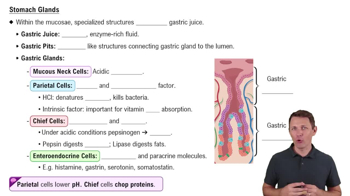Mark the following statements as true or false. If a statement is false, correct it to make a true statement.
The mucosa of the esophagus, pharynx, and oral cavity contains simple squamous epithelium to protect it from abrasion.
 Verified step by step guidance
Verified step by step guidance Verified video answer for a similar problem:
Verified video answer for a similar problem:



 6:28m
6:28mMaster Organs of the Digestive System with a bite sized video explanation from Bruce Bryan
Start learning